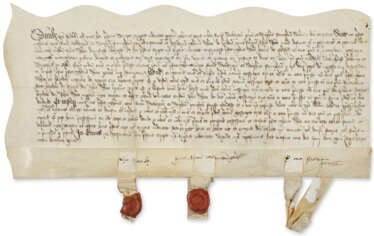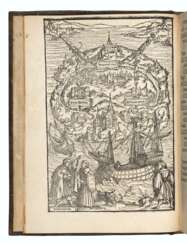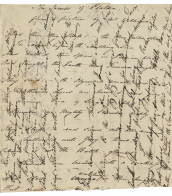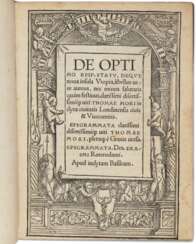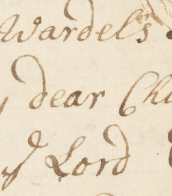thomas more (1478 - 1535)
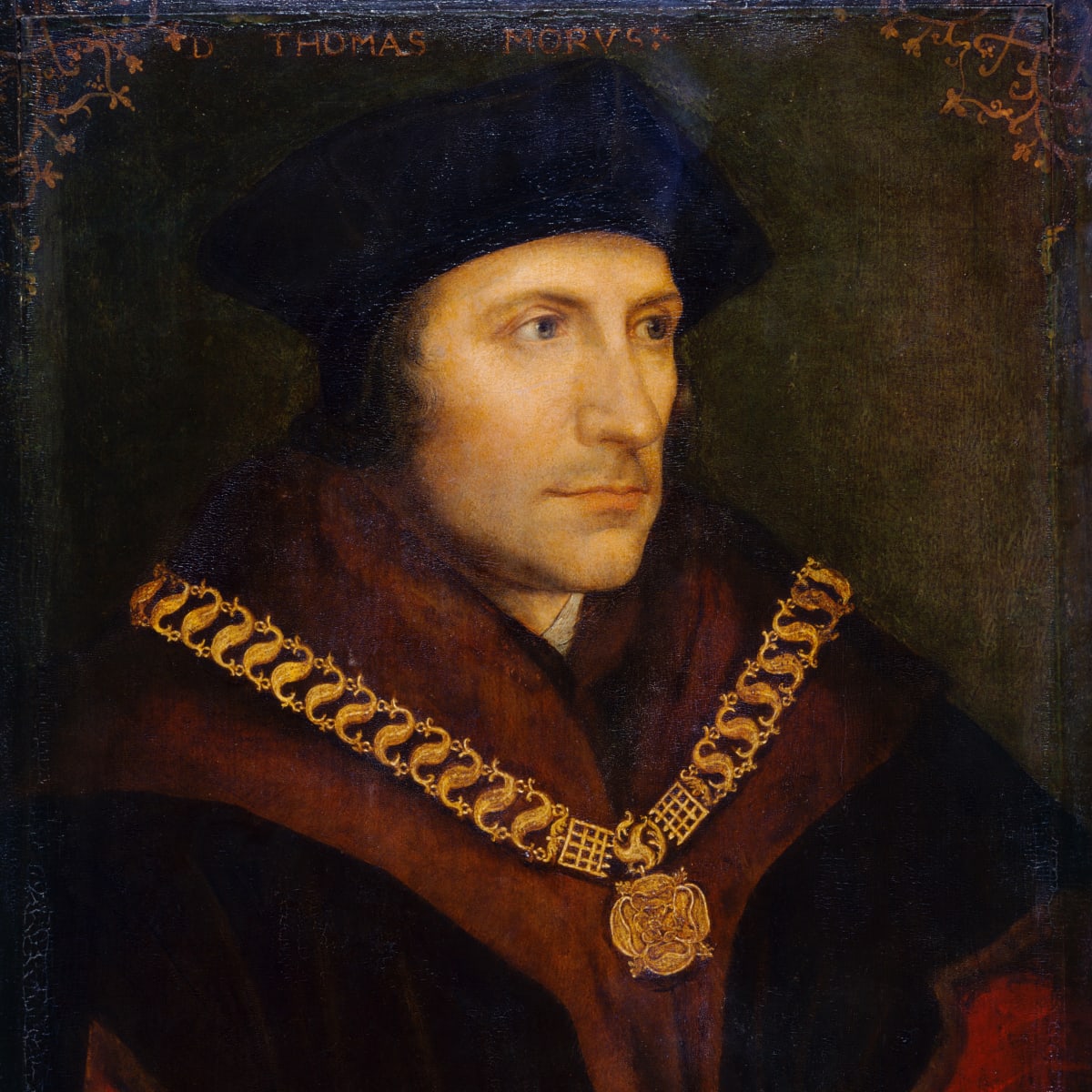
Thomas More was a British lawyer, humanist philosopher, writer and statesman.
As the son of a London judge of the Royal High Court, Thomas studied at Oxford and then in London with the best lawyers. More also studied the works of the ancient classics, improved in Greek and Latin languages, composed his works. In 1497 More met and became friends with Erasmus of Rotterdam, became a member of his humanist circle.
In 1510-1518 Thomas More was deputy sheriff of London, and in 1517 entered the service of the king, becoming one of the most effective and trusted civil servants of Henry VIII. He acted as his secretary, interpreter, speech writer, chief diplomat, counselor, and confidant. He was knighted in 1521, became Speaker of the House of Commons in 1523, and in 1525. - Chancellor of the Duchy of Lancaster. Around 1515. More wrote The History of Richard III, and in 1516 he published his most significant work, Utopia, in which he described an imaginary ideal state.
Thomas More opposed the divorce of King Henry VIII from Catherine of Aragon and refused to recognize the king as the head of the Church of England, as required by the Act of Supremacy in 1534. For his refusal, he was beheaded in the Tower of London in 1535. 400 years later, in 1935 Thomas More was canonized by the Catholic Church, and in 1980 the Church of England recognized him as a "saint and hero of the Christian Church."


Thomas More was a British lawyer, humanist philosopher, writer and statesman.
As the son of a London judge of the Royal High Court, Thomas studied at Oxford and then in London with the best lawyers. More also studied the works of the ancient classics, improved in Greek and Latin languages, composed his works. In 1497 More met and became friends with Erasmus of Rotterdam, became a member of his humanist circle.
In 1510-1518 Thomas More was deputy sheriff of London, and in 1517 entered the service of the king, becoming one of the most effective and trusted civil servants of Henry VIII. He acted as his secretary, interpreter, speech writer, chief diplomat, counselor, and confidant. He was knighted in 1521, became Speaker of the House of Commons in 1523, and in 1525. - Chancellor of the Duchy of Lancaster. Around 1515. More wrote The History of Richard III, and in 1516 he published his most significant work, Utopia, in which he described an imaginary ideal state.
Thomas More opposed the divorce of King Henry VIII from Catherine of Aragon and refused to recognize the king as the head of the Church of England, as required by the Act of Supremacy in 1534. For his refusal, he was beheaded in the Tower of London in 1535. 400 years later, in 1935 Thomas More was canonized by the Catholic Church, and in 1980 the Church of England recognized him as a "saint and hero of the Christian Church."


Thomas More was a British lawyer, humanist philosopher, writer and statesman.
As the son of a London judge of the Royal High Court, Thomas studied at Oxford and then in London with the best lawyers. More also studied the works of the ancient classics, improved in Greek and Latin languages, composed his works. In 1497 More met and became friends with Erasmus of Rotterdam, became a member of his humanist circle.
In 1510-1518 Thomas More was deputy sheriff of London, and in 1517 entered the service of the king, becoming one of the most effective and trusted civil servants of Henry VIII. He acted as his secretary, interpreter, speech writer, chief diplomat, counselor, and confidant. He was knighted in 1521, became Speaker of the House of Commons in 1523, and in 1525. - Chancellor of the Duchy of Lancaster. Around 1515. More wrote The History of Richard III, and in 1516 he published his most significant work, Utopia, in which he described an imaginary ideal state.
Thomas More opposed the divorce of King Henry VIII from Catherine of Aragon and refused to recognize the king as the head of the Church of England, as required by the Act of Supremacy in 1534. For his refusal, he was beheaded in the Tower of London in 1535. 400 years later, in 1935 Thomas More was canonized by the Catholic Church, and in 1980 the Church of England recognized him as a "saint and hero of the Christian Church."


Thomas More was a British lawyer, humanist philosopher, writer and statesman.
As the son of a London judge of the Royal High Court, Thomas studied at Oxford and then in London with the best lawyers. More also studied the works of the ancient classics, improved in Greek and Latin languages, composed his works. In 1497 More met and became friends with Erasmus of Rotterdam, became a member of his humanist circle.
In 1510-1518 Thomas More was deputy sheriff of London, and in 1517 entered the service of the king, becoming one of the most effective and trusted civil servants of Henry VIII. He acted as his secretary, interpreter, speech writer, chief diplomat, counselor, and confidant. He was knighted in 1521, became Speaker of the House of Commons in 1523, and in 1525. - Chancellor of the Duchy of Lancaster. Around 1515. More wrote The History of Richard III, and in 1516 he published his most significant work, Utopia, in which he described an imaginary ideal state.
Thomas More opposed the divorce of King Henry VIII from Catherine of Aragon and refused to recognize the king as the head of the Church of England, as required by the Act of Supremacy in 1534. For his refusal, he was beheaded in the Tower of London in 1535. 400 years later, in 1935 Thomas More was canonized by the Catholic Church, and in 1980 the Church of England recognized him as a "saint and hero of the Christian Church."
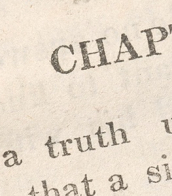

William Shakespeare was a British poet and playwright and writer.
William's father, John Shakespeare, was a merchant and official in Stratford. There are reports that he was a sailor for a time before joining a theater company in London. Beginning in the 1590s, Shakespeare began writing plays, and in 1593 he published a poem, Venus and Adonis, which became popular. He dedicated it to the Duke of Southampton, who was a philanthropist and patron of talent, and soon his business was booming.
From 1592 to 1600 Shakespeare wrote his dramas and romantic comedies "Richard III", "The Taming of the Shrew", "Romeo and Juliet", "A Midsummer Night's Dream" and "The Merchant of Venice", as well as the comedies "Much Ado About Nothing", "Twelfth Night" and the tragedy "Julius Caesar". The playwright's business was so successful that he even bought a large house in Stratford. In 1599, Shakespeare became one of the owners, playwright and actor of the new theater "Globe". In 1603 King James took Shakespeare's troupe under his direct patronage. In the mature period, the great playwright turned to tragedies, there were "Hamlet", "Othello", "King Lear", "Macbeth" and others.
Although in the 19th century researchers had some doubts about the authorship of many of these works, William Shakespeare is considered the greatest English playwright, one of the best playwrights in the world. His plays have been translated into all major languages and to this day form the basis of the world theatrical repertoire, most of them have been screened many times. According to the Guinness Book of Records, Shakespeare remains the world's best-selling playwright, and his plays and poems have sold more than 4 billion copies in the nearly 400 years since his death.







